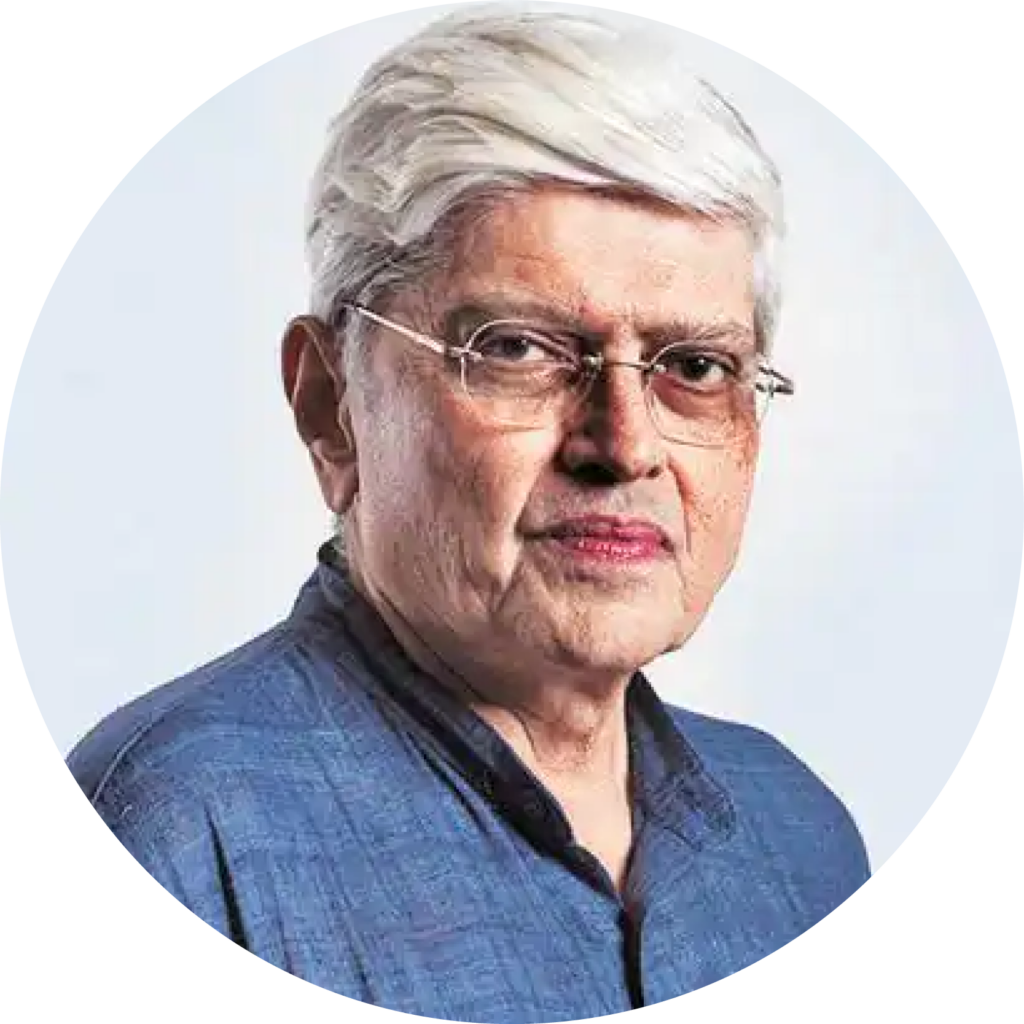
Transcript of
Gopalkrishna Gandhi’s
tribute to Keshav Desiraju

He was himself.
Un-typecast, un-predictable.
A scholar, if ever there was one, he confounded intellectuals, free-thinkers, bohemians by choosing a much-travelled-by road – the Indian Administrative Service.
That particular conformism he wore like a badge of honour, specialising in the ins and outs of that road which is often a highway, oftener a meandering lane. But always much travelled by. You cannot get more ‘regular’ than by ‘taking a shot’ at that public exam.
Keshav did not oblige non-conformism there.
Individualists in the civil services – a euphemism for misfits – fancying themselves to have a life beyond Sarkari files take voluntary retirement to become academics or columnists. Keshav stayed the course doggedly. He knew he can read as much as would like to and do his Sarkar work. Writing, yes, he kept for after he had retired. For writing, to him, was not a breeze. It was something that carried responsibility, accountability.
Where so many of us thought he would in high dudgeon fling away his covenant with Government after he was so rudely moved out of the Ministry of Health, he did nothing of the kind. He moved into Consumer Affairs with a muffled grumble, perhaps, but nothing more.
A career in the UN’s many organisations is welcomed by the salaried official class mainly for the perk of a life-long pension of handsome scale. Would Keshav scruple to say no to such a chance to work in a UN organisation? No, of course not. But Keshav would not stretch his tenure there to touch the magic five years that would earn him that pension. He stepped out of the golden turnstile just before it made that quinquennial spin.
A stint in the Ministry of Finance can be a passport to the World Bank or the IMF. A term in the Ministry of Health can logically open the door to the WHO. Was Keshav averse to that? No, of course not. But beyond an expression of slight interest, when sounded, he would do no more. Lobbying was revolting to Keshav.
So, if he disappointed radicals, he did not belong to the standard IAS type either.
‘Kuchh farq-type ke hain’, I can hear a liveried peon outside his office say to another. ‘Suna hein kisi bade admi ke potey hein… Shayad koyi Maharaja-type ke… South se…’
‘Radhakrishnan’ was never part of his name. But the ancestry hovered around his stature. The silver head of hair, long bespectacled face, an English that seemed a cut above the routine. A courtesy that was very Indian as when he brought his alms together in a namaskar or bent ever so slightly before an elder, especially a skilled elder, made him an Indian aristocrat. But his handshake was of an occidental origin – softly firm. And meant to be formal and yet friendly.
He never flaunted his family’s great name. But he never stood in the way of it being mentioned when it was naturally done. He let that part steal over him like a shawl, softly, almost incidentally, but comfortably. No false modesty, no put on humble-humble stuff. Keshav had the natural humility of the aristocrat, the becoming modesty of the patrician, the civility of the cultivated. Nothing of the arrogance, none of the stiffness, not a hint of the pride of the upper class that wears varnish over flawed tissues.
Keshav was among friends, Horatio to several Hamlets minus the Prince’s eloquent madnesses – wise, circumspect, soft-spoken and in few words, inviting confidences but never playing a role that would have dramatic effects to the play.
He was among peers a B.N.Rau to celebrity Constitution-makers, vastly more knowledgeable than members of the Drafting Committee but choosing to stay out of the limelight.
He was among books not David Copperfield or Oliver Twist but Hard Times, satirising society with mordant humour but not nearly savage.
He was among paintings not Picasso’s Guernica, not Rembrandt’s The Night Watch. He was Constable’s The Cornfield with a young shepherd boy drinking from a pool in the summer heat.
He was, in the genre of films, not the fan-hit mega-cinemas that tumble out of screens in glaring colours but the softer celluloids like the Hindi ‘Lunch Box’, or from Britain, ‘The King’s Speech’ and ‘The Pianist’.
Keshav had the snobbery of good taste, not of a bad manner. He had the unself-conscious self-awareness of quality which did not judge things and people of less quality because it was unnecessary to do so and because in any case, that was no function of quality. Quality judges only a higher quality and then not to compare, much less to compete but only to raise the gold’s carat-weight.
In all he did Keshav sought quality.
Not brilliance, not eminence, not summits, not heights of dizziness or depths of gravity. Just quality. He sought the truly such and such, the real, the ‘that’s it’ in things. Be it coffee, or conversation, a Conjeevaram sari for a friend or a friend’s wife, or a soft wool cardigan. Or be it music.
His sisters he adored, his friends he cherished. Those who resented or envied him, he forgave in the fleeting fractions of a moment that he thought of them.
He had his fondnesses, his loves, his passions.
He was fond of Radhakrishnan. He was. There is no denying it. But he was no less fond of his uncle, Gopal. And if his uncle was rather taken up with Nehru, so was Keshav rather taken up by M S Subbulakshmi. He was to pour his heart-mind into his biography of that wonder-woman. If he was jealous about protecting anything, it was his exclusive understanding of the music of Madurai’s daughter. There, he would allow no one to enter.
And it is just as well that it was so. He wrote in the next thing to secrecy – utter privacy.
Like a pearl in its oyster-clasp, that book grew to maturity – slowly but steadily. And typically of Keshav, he did not rush to print in the centenary year where everyone and anyone wrote and spoke or, worse, sang, in the memory of the peerless centenarian. The book will come, he said, when it is ready to come. Typical Keshav.
That MS picture on its cover, I told him, has a mischief to its smile. She reminds me of the phrase mukhete tambulam… She seems to have just had a succulent paan… So she does he said, so she does…
He had his private rasanubhavaas, Keshav did.
In work or at rest.
The human brain fascinated him. In health and in difficulty.
Charles Lamb, it is said, wrote his summaries of Shakespeare’s grim plays. He left the happy ones for his sister Mary who was of disturbed mind.
Keshav has left happy memories for us. His grandfather, Radhakrishnan once said from his high seat in the Rajya Sabha: ‘There is a touch of…in all of us.’ I will not say the word. We know what it is.